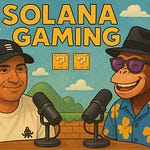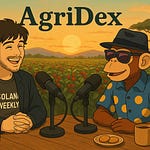A Conversation with Magellan from Maps.fun
In this episode, Thomas interviews Magellan from Maps.fun about their groundbreaking platform that enables cities to launch their own tokens and build self-governing communities. The discussion explores the fusion of blockchain technology, urban development, and community organization, offering a glimpse into the future of decentralized city governance.
Episode Summary
Magellan, drawing from his background in geospatial science and planning, explains how Maps.fun emerged as a response to innovative projects like CityDAO, CityCoins, and CabinDAO. The platform is designed as a launchpad for cities—both in the US and internationally—to create tokens, fund projects, and self-govern. With a particular focus on smaller communities, the conversation delves into the mechanics of geographically restricted token sales, community engagement, and the evolving economic philosophy that underpins this new approach to urban development.
Key Highlights
1. Origins and Vision
• Foundational Background:
Magellan’s expertise in geospatial science and planning paved the way for creating Maps.fun.
• Inspiration:
Projects such as CityDAO, CityCoins, and CabinDAO served as key influences.
• Core Idea:
The platform acts as a launchpad for cities to issue tokens and establish self-governing communities.
• Target Audience:
Focus on both US and international cities, with a keen interest in smaller communities where bonds can be stronger.
2. Platform Mechanics
• Token Sales Structure:
• Geographic Restrictions: 70% of tokens are reserved for local residents, while 30% are available to the general public.
• Weekly Competitions: City token launches are organized through a competitive weekly system.
• Governance and Fee Structure:
• Token22 Program: The platform integrates this program to manage fees.
• Exploration of Futarchy: Investigating a governance model based on predictive markets.
• Blockchain Backbone:
• Built on the Solana blockchain to ensure speed, scalability, and cost-efficiency.
3. Current Status and Community Engagement
• Launch Milestones:
• Launched three weeks ago with two initial cities: New York and San Francisco.
• Community Interest:
• Over 50 communities have already expressed interest in adopting the platform.
• Growth Goals:
• Aim to have 50 active city DAOs within six months.
• Target that 50% of these DAOs evolve into vibrant physical communities within one year.
Deep Dive: Key Concepts and Economic Philosophy
Evolution of Communities
• Transitioning from Virtual to Physical:
• Moving from cloud-based communities to land-based, physical communities.
• Building Trust Through Proximity:
• Emphasis on the importance of proximity networks, where accountability and relationships are inherently stronger.
• Leadership and Community Organization:
• Recognizing the role of local leadership in driving engagement and trust.
Economic Philosophy
• Universal Basic Ownership:
• Advocates for a model where citizens gain a stake in their community’s assets, as opposed to a universal basic income.
• Dot.fun Economy:
• Envisioning a new economic layer that integrates seamlessly with existing city infrastructures and governance models.
City-Specific Implementation
• Local Flexibility:
• Implementation strategies are tailored to the unique needs of each city.
• Urban Tech Innovations:
• The platform is designed to integrate with emerging urban technologies, solving localized problems and enhancing city services.
Notable Quotes
“Maps.fun is fundamentally, in the simplest sense, a launchpad for cities and city communities to launch a token for themselves and to self-govern that token and fund it.”
“Cities are networks of relationships based on proximity… accountability is very high in networks of proximity because you cannot vanish.”
“The number of atoms are fewer, but the bonds between the atoms are stronger.”
— On the strength and resilience of smaller cities.
Technical Details
• Blockchain: Solana
• Fee and Governance:
• Utilizes the Token22 program
• Exploring Futarchy as a governance mechanism
• Token Sales:
• Geographically restricted to prioritize local residents
• Community-managed treasury system ensures local control and accountability
Future Vision
• Urban Tech Integration:
• Continued focus on incorporating the latest urban tech innovations to meet evolving city needs.
• Practical, Community-Driven Solutions:
• Aiming to replace traditional municipal funding with community-powered, decentralized funding mechanisms.
• Organic Growth:
• Emphasis on the gradual development of city DAOs, fostering sustainable and resilient communities over time.
How to Get Involved
• Follow Maps.fun on Twitter:
• App Launch:
• Keep an eye out for the upcoming mobile and web app launches.
• Community Outreach:
• Communities interested in launching their own token can reach out directly for support.
• Engagement:
• Participate in local meetups and engage online to be part of the movement toward decentralized urban development.
Key Takeaways
1. Shift in Governance:
• Maps.fun is spearheading a move from traditional city governance to community-driven, decentralized models.
2. Flexibility Over One-Size-Fits-All:
• The platform’s adaptable approach caters to the unique needs of each city, especially smaller communities.
3. Strengthening Community Bonds:
• By combining digital innovation with physical community engagement, Maps.fun aims to create stronger, more resilient urban networks.
4. Revolutionizing Municipal Funding:
• The initiative presents a potential paradigm shift in how cities fund and manage their projects through token-based economies.
Conclusion:
This episode offers valuable insights into the transformative potential of blockchain in urban development. Magellan’s vision for Maps.fun not only reimagines city governance but also highlights a path toward more connected, accountable, and innovative communities. Whether you’re a city planner, tech enthusiast, or community leader, this discussion provides a roadmap for the future of decentralized urban development.














Share this post